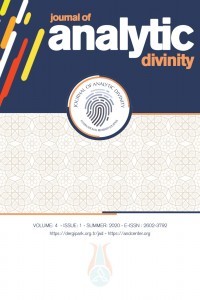Ağır Hastalarda Dini Başa Çıkma
Din psikolojisi, Ağır Hastalık, Ağır Hasta Psikolojisi, Başa Çıkma, Dinî Başa Çıkma, Psychology of Religion, Serious Illness, Psychology Of The Seriously Ill, Coping, Religious Coping
Religious Coping in Severely Ill Patients
Psychology of Religion, Serious Illness, Psychology Of The Seriously Ill, Coping, Religious Coping,
___
- Akdemir, Nuran- Bostanoğlu, Hatice- Yurtsever, Sabire v. dğr. “Yatağa Bağımlı Hastaların Evde Bakım Hizmeti”. Dicle Tıp Dergisi 38/1 (2011), 57-65.
- Amer, Mona M-Hovey, Joseph D-Fox, Christine M-Rezecallah, Alexander. “Initial Development of the Brief Arab Religious Coping Scale (BARCS)”. Journal of Muslim Mental Health 3 (2008), 69-88.
- Anderson, J Miriam-Marwit, J Samuel-Vandenberg, Brian. “Psychologial and Religious Coping Strategies of Mothers Bereaved by the Sudden Death of a Child”. Death Studies 29 (2005), 811-826.
- Ayten, Ali. Din Erdem ve Sağlık. İstanbul: Çamlıca, 2015.
- Ayten, Ali. Din ve Sağlık Kavram, Kuram ve Araştırma. İstanbul: Marmara Akademi, Yayınları, 2018.
- Ayten, Ali. Tanrı’ya Sığınmak. İstanbul: İz Yayıncılık, 2015.
- Boyle, Thuné v. dğr., “Do Religious/Spiritual Coping Strategies Affect Illness Adjustment in Patients with Cancer? A Systematic Review of the Literature”, Social Science & Medicine 63 (2006), 151-164.
- Druss, Richard G. Hastalığın Psikolojisi. Ankara: Compos Mentis Yayınları, 1997.
- Göka, Erol. Ölme, Ölümün ve Geride Kalanların Psikolojisi. İstanbul: Timaş Yayınları, 2009.
- Holland, Kathleen Dukes - Holahan, Carole K. “The relation of social support and coping to positive adaptation to breast cancer”, Psychol Health 18 (2003), 15-29.
- Kirkpatrick, Lee A. - Shaver, Phillip R. “Attachment Theory and Religion: Child Attachments, Religious Beliefs and Conversion”, Journal for The Scientific Study of Religion 29/3 (1990), 315-334.
- Koening, Harold-Pargament , Kenneth I-Nielsen, Julie.” Religious Coping and Health Status in Medically Hospitalized Older Adults”. Journal of Nervous and Mental Disease 186 (1998), 513-521.
- Kübler-Ross, Elisabeth. Ölüm ve Ölmek Üzerine. Ankara: April Yayıncılık, 2010.
- Lazarus, Richard - Folkman, Susan. Stress, Appraisal and Coping. New York: Springer, 1984.
- Mete, Hayriye Elbi. “Kronik Hastalık ve Depresyon”. Klinik Psikiyatri Dergisi 11/3 (2008), 3-18.
- Pargament, Kenneth I. Çev. Ali Ulvi Mehmedoğlu. “Acı Tatlı Dindarlığın Bedelleri ve Faydaları Üzerine Bir Değerlendirme”. Ç. Ü. İlahiyat Fakültesi Dergisi 5/1 (2005).
- Post, Stefan G. Religion and Mental Health, Handbook of Mental Health. ed. Harold G. Koening. San Diego, London, Boston, New York: Academic Press, 1998.
- Roelofs, Karin-Spinhoven, Philip- Sandijck, Pieter-Moene, Franny C-Hoogduin, Kees A. L. “The impact of early trauma and recent life-events on symptom severity in patients with conversion disorder”. The journal of of Nervous and Mental Disease 193/8 (2005), 508-514.
- Rolland, John S. “Chronic Illness and the Life Cycle: A Conceptual Framework”, Fam Proc 26 (1987), 203-221.
- Thunè- Boyle, Ingela C- Stygall Jan A v. dğr. “Do Religious / Spiritual Coping Strategies Affect Illness Adjustment in Patients with Cancer? A Systematic Review of the Literature”. Social Science & Medicine 63 (2006), 151-164.
- Tokur, Behlül. İmtihan Psikolojisi. Ankara: Fecr Yayınları, 2018.
- Tokur, Behlül. Klasik ve Güncel Konularıyla Din Psikolojisi. Ankara: Son Çağ Yayınları.
- Tokur, Behlül. Stres ve Din. İstanbul: Çamlıca Yayınları, 2017.
- Ventis, Larry. “The Relations Between Religion and Mental Health” Journal of Social Issues 51/2 (1995), 33-48.
- Wachholtz, Pearce - Koening, Harold G. “Exploring the Relationship Between Spirituality, Coping and Pain”, Journal of Behavioral Medicine 30 (2007), 311-318.
- Yapıcı, Asım. Ruh Sağlığı ve Din/ Psikososyal Uyum ve Dindarlık. Adana: Karahan Kitabevi, 2021.
- Yayın Aralığı: Yılda 2 Sayı
- Başlangıç: 2017
- Yayıncı: Özcan GÜNGÖR
Kent Olgusu ve Kent-Din İlişkisi Üzerine Sosyolojik Bir Değerlendirme
Türkiye’de Yapılmakta Olan Kur’an Araştırmalarında Bir Okuma
Kur’an Âyetleri Bağlamında İnsanın Elementer Yaratılışının Değerlendirilmesi
Ağır Hastalarda Dini Başa Çıkma
İslam Tarihinde İz Bırakan Bir Kabile: Beni Hanife Kabilesi ve Hz. Peygamberle İlişkisi
İlahiyat Eğitiminin Dönüştürücü Etkileri: Uluslararası İlahiyat Öğrencileri Örneği
Ergenlerde Adil Dünya İnancı ve Dindarlık İlişkisi
Pakistan’daki Din Psikolojisi Çalışmalarına Genel Bir Bakış
Ortaöğretim Öğrencilerinde Sosyal Değerler ve Dindarlık İlişkisi
